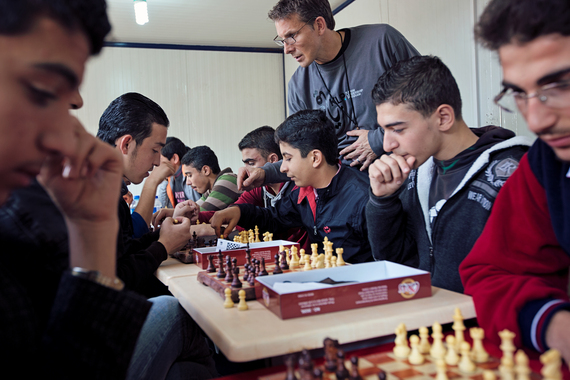The lone American in the trailer leans over the students to study their moves, his Syrian translator practically attached to his hip. The Karam Leadership Program identification card hanging around his neck sways side-to-side as he points out a strategic mistake. The space is a cramped trailer sitting behind a fence in the refugee school courtyard. The students are all survivors of the Syrian regime's brutal violence against its own people. They are refugees living in Turkey, grieving the loss of the life they had before the conflict. Any student over 14 could sign up, and there are just as many classes offered for the girls as the boys. They sit in sets of two, unique battles upon the boards between them, defeated pieces somberly set to the side.
"We are either kings or pawns of men," once said Napoleon Bonaparte. Thus, life is a kind of chess game. We maneuver our pieces (and ourselves) within a confined landscape and redefine our strategy as obstacles present themselves. We are told the rules as novices, but only understand the many possible paths within our confines as we master the craft. Those practiced at the art of delayed gratification and long term strategic thinking tend to do far better, not only at surviving, but at achieving their goals be what they may.
So, while the idea of bringing a chess camp to refugee teens living in a conflict zone is a unique one, its logic is evident. Karam, the non-profit foundation funding the chess camp, worked with Stuart Kruse; the American volunteer who designed, developed and then traveled to the border of Turkey and Syria to implement the program. The Kruse chess camp begins with workshops on just the Pawns. The King and Queen are soon added. The Nights, Bishops and Rooks come last. As the constraints and liberties of each piece is taught, the mystical dance of the game plan becomes evident. Kruse's translator, Abdulsalam Dallal, a brave young Syrian who speak fluent Turkish, Arabic, English, and Kurdish, and who before his work for Karam was a translator for International Blue Crescent, is thoroughly enjoying himself.
"This is the first time in my life as a translator that I have been both a teacher, and a student!" Salam explains. "I never knew how to play chess, you see, until now!" As he learns from Kruse, the teenagers are glued to his every translated word.
Kruse and Abdulsalam increase their credibility through the pick-up basketball games they organize in the courtyard in between classes. Kruse, a 48-year-old, six-foot-tall man can still dunk a ball.
Back in the trailer, the interest in chess is palpable. Every student is engaged. Kruse, too, is deeply absorbed as he moves from board to board, perfecting methodology, teaching each student how to avoid a pitfall or design a trap. It seems nothing can break the collective concentration of this odd mixture of American teacher, his translator and the Syrian refugee teens, converged in an overheated trailer at the Turkey-Syrian border -- nothing except the sound of gunfire clearly coming from the street just outside the school. There were more than twenty shots were fired over a period of only a minute or two. Outside the trailer in the schoolyard, no one seems particularly alarmed. The sizable school gates eliminate a view of what lies on the other side, so Kruse calmly leaves the trailer to investigate the matter. He returns but a few moments later with a smirk on his face. "It's just a wedding," he says. They go on with their games.
Coaching the objectivity necessary to step back and think, not only in times of strife, but also when there is an initial appearance of a seemingly positive event. Instructing perseverance through a methodology both ancient and innovative.
My thoughts return to Napoleon. Are we all really kings or pawns? Did he really even say that?
Napoleon, arguably the most famous general of all time, dominated and revolutionized Europe for nearly twenty years. Nearly 200 years after his death, his military tactics are still studied at military schools worldwide. He also betrayed everyone.
Perhaps in the end, the more poignant saying is that old Irish proverb, "When the Chess game is over, the pawn and the king go back to the same box." When faced with utter injustice of the horrific sort that is the Syrian crisis, the massacre of the innocent, the hunger of the old, the killing of aid workers, knowledge of the inevitable box that awaits us all can be a sort of comfort.
Perhaps, what matters most is simply the integrity with which the game is played. Passion for the pawns that form the spirit of the game. Empathy for the "other." A child across the globe with blood smeared across his cheek. A refugee grandfather without socks in a bitter chill. A mother in a red-patterned headscarf washing dishes with her eyes on the Koran on the mantle. The condemnation of injustice even if it does not touch our own children or plague our own neighborhood. Rather, striving for a vision of all humanity as neighbors.
With these thoughts, I conclude my six-part series based on my experiences working with Syrian refugee teens and children in a conflict zone at the border of Turkey and Syria. I encourage each and every reader to consider, for a moment, that the Syrian crisis could very well be the greatest humanitarian crisis of today. And to remember that any one person is powerful enough to make dramatic changes in the lives of others across the globe, if only we have faith in our joint humanity and connectivity.
Many thanks for your "likes," shares, tweets, and thoughtful commentary. Dynamic and respectful conversation is welcomed and appreciated.
Yours,Shermin
Shermin Kruse is the author of Butterfly Stitching.

